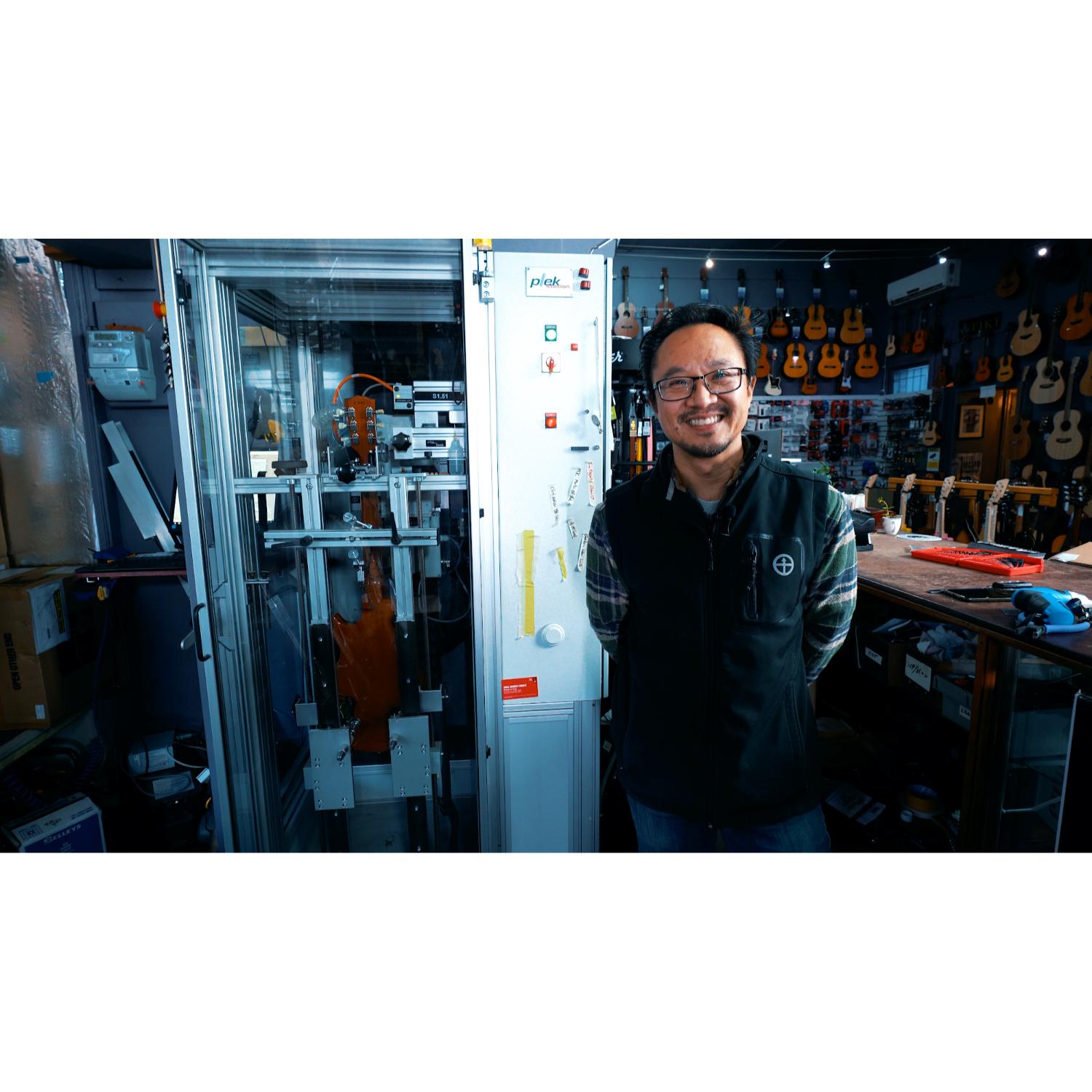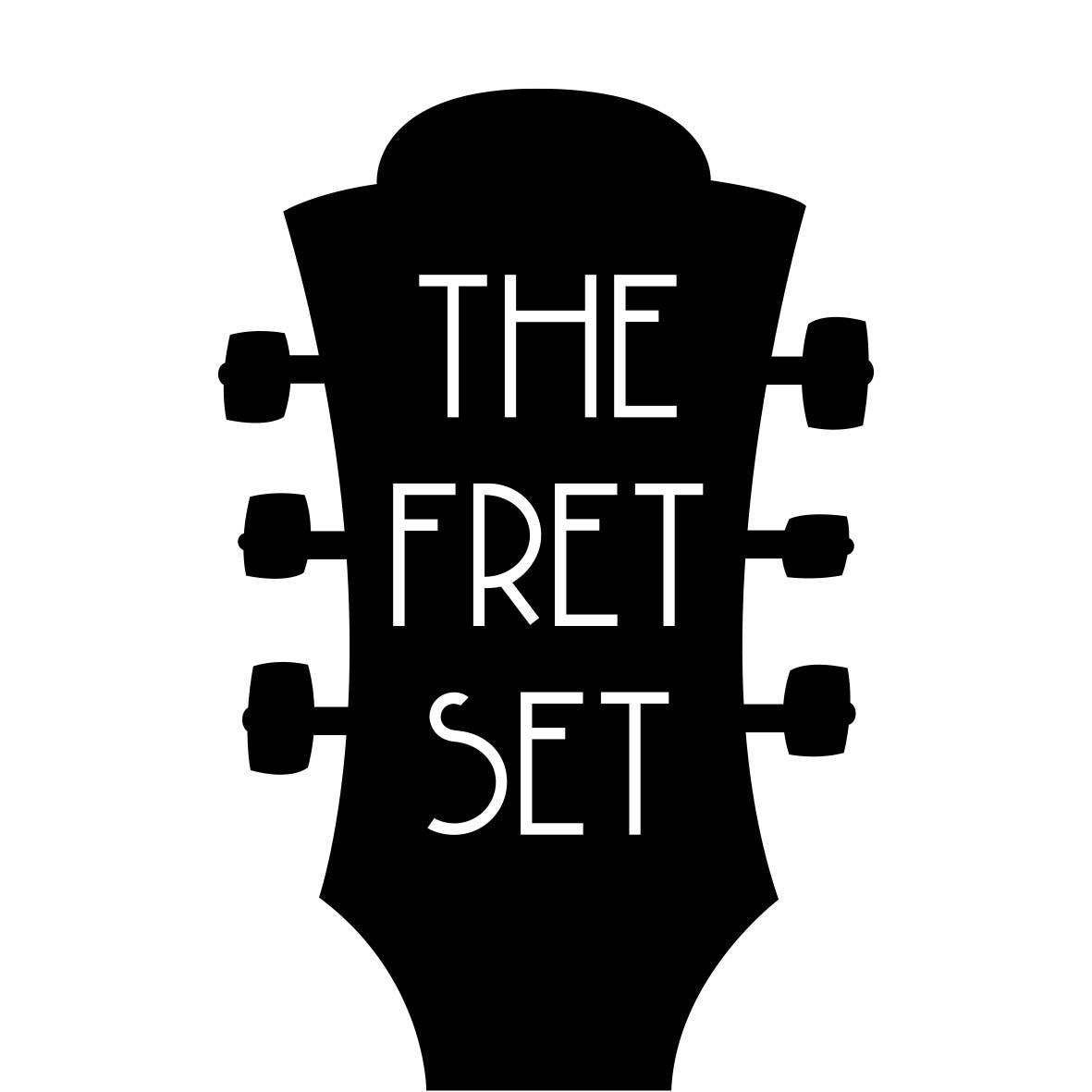
The Fret Set Gold Standard Plek Setup & Dress Includes:
- Setting your truss rod for optimal relief
- Installing your preferred brand and gauge of strings (strings are purchased separately)
- Scanning your fretboard into the Plek machine
- Recording the measurements
- Setting the action to optimum height
- Precision machining your frets for the best playing experience
- Cutting nut slots for better action and tuning stability (if optional nut ordered)
- Polishing your frets to a high shine
Why get your guitar Plek’d?
Next to tone, your bass or guitar’s playability will generally be regarded as one of the most important aspects of said instrument. A Plek machine in the hand of a high skilled luthier will result in your guitar playing at it’s optimum.
What makes a Plek machine so special? It simply takes out the guess-work
The Plek is a highly specialized machine capable of measuring and leveling frets with a level of accuracy many more times than the human eye would allow. It will yield results that are more consistent and quantifiable.
To grossly oversimplify its process, it optimizes the playability of your instrument by leveling the fretboard and frets to allow for the string oscillation to be free and clear on every note, for every possible action. It analyses the neck, registering over 6,000 data points, with an accuracy of .001mm, and gives us a graphical representation of what your instrument looks like that no human eye could ever possibly see. You will now see the relative level of each fret, the relief of the neck, the shape of the fretboard, the radius along the length of the neck, nut slot height.
So… it’s a magic machine?
Well, yes.. and no.
You’ll need a highly skilled operator who will take the information the Plek provides and along with the luthier’s years of experience, tailor an outcome that is personalized just for you.
And boy are we lucky to have Derek Chan from The Fret Set. Derek is an alumni of the Roberto-Venn School of Luthiery, one of the oldest guitar building and repair schools in North America. He then went on to work at the hallowed halls of Collings Guitars, working in a small team of skilled luthiers where arguably some of the world’s finest instruments are being produced at the moment. He then moved back to Australia when he took on the role of Head of Repairs at Maton Guitars here in Melbourne. Derek decided it was then time to strike out on his own and made the significant investment of purchasing a Plek machine so that we could enjoy the significant upgrade upon the old ways of doing things.
So like Excalibur was to Arthur or Pippen to Jordan, this one-two punch of Derek and his Plek machine are at Music Junction to make sure you get the bespoke result you and your guitar deserve. The end result being our mantra; To inspire you to keep playing.
Place an order for a Gold Standard Plek Setup & Dress to get the best out of your guitar. It's not just a Plek scan, you get Derek Chan setting up your guitar, just the way you want it. Derek will personally make contact to have a conversation about your setup preferences before work begins. The work will be completed prior to shipping your guitar to you and you will receive all documentation via email and shipped with the guitar for your records.
What the Plek is...
The Plek machine is a high-precision scanning and fret milling machine. What that means is that it is a tool that allows a skilled luthier to get the lowest, cleanest action a fretted instrument can have in far less time than could be achieved by hand tools alone. For a set action, every note on every fret will ring clear and consistently. It can do this to a level of accuracy that is better than a human can achieve with hand tools alone.
How it does it...
OK this might get a bit technical, so bear with me. Using the preferred strings of the owner, the Plek scans the exact height of each string over each fret and the height of each fret relative to the fingerboard. It does this over the whole neck while the instrument is tuned to pitch. The luthier then examines this information and decisions must be made about whether frets have enough height to be milled or if the neck is straight enough for a clean action.
The strings are then removed for the Plek to mill the frets, and this is where the real power of the Plek comes in to play. It uses the data from the scan to “remember” how much fret to mill relative to the fingerboard and strings when the instrument was tuned to pitch, even though all the string tension has been removed. It is important to note that the neck moves under tension of the strings, so its shape can change depending on whether its under tension or not, even with the truss rod adjusted to compensate for the lack of tension. It can then mill the frets to the desired height. It can also cut string slots in the nut to the desired height and the correct width for the preferred string gauge.
The Plek takes into account all the idiosyncrasies of each instrument. Some frets are worn more than others. Some necks have humps and twists in them when tuned to pitch but not when the string tension is removed etc…the Plek takes all this into account and mills the fret to .001mm accuracy, which is, let’s face it, more than enough accuracy for the job required.
The role of the luthier
The Plek is amazing at scanning and milling frets, but it is still just a tool. You can’t just put an instrument in it and expect a perfect result without a skilled luthier controlling it and dealing with the frets after the instrument comes out of the Plek. The luthier needs to assess the playing style of each player and the best set up for them. Decisions need to be made as to whether some frets are too worn and need to be replaced, or if the fingerboard/neck is too twisted or lumpy for an acceptable fret mill and so on. The frets still need to be dressed and polished after being milled. I have done many refrets before I got a Plek, so I know the whole process without this incredibly accurate machine. No Terminator Skynet in charge here, just us luthiers.
Words of caution
There are physical limits for scale lengths and sizes of instruments that the Plek can accommodate. It can deal with scalloped fingerboards, but not fan frets (yet). It can mill frets on a ukulele, but only below the 13th fret on a mandolin because beyond the 13th fret the frets get too close together (most mandolins have a fall away that starts there anyway). Acoustic basses might just be too darn big to fit. Sitars are meant to, um, sitar anyway, aren’t they? Then there’s them banjos….with a 5th string that starts partway down the neck. Banjos can be accommodated in the Plek.
Nearly all fretted instruments are made from wood (there are a small number of exceptions made from carbon fiber, plastics and metals etc), and wood is hydroscopic. This means that wood instruments gain or lose moisture from the air in their environment. As the environmental conditions change, so will the moisture content in the instrument, causing expansion and contraction. The more stable the environment, the less expansion/contraction the instrument will undergo. This movement can affect the action of an instrument. Plekking an instrument means it will have the optimum setup in the conditions in the shop that are monitored and maintained, but if you take that instrument from Melbourne and, say, spend a month in the tropics, it WILL affect the action.
Derek Chan
Derek gravitated towards guitars in his teen years when he realised how much easier they were to play in tune as compared to his violin, leading him to build his first electric guitar which he subsequently encrusted with paisley wallpaper (don’t ask – it was the 80s). After hitchhiking through Turkey and earning a philosophy degree he pursued hectic careers in restaurants and human resources then attended the Roberto-Venn School of Luthiery and somehow ended up working at Collings Guitars in Austin, Texas. There he was subjected to higher than recommended levels of bluegrass, country and western swing. The proliferation of offspring meant a return to Australia culminating in his employment at Maton as the head of repairs before striking out on his own with a Plek machine at The Fret Set.
Guitarati
- 8 Ball Aitken
- Adam Halliwell (Mildlife)
- Adam Harvey
- Adam Stockdale (Albatross)
- Alejandro Espino Aldana (The Lone Mariachi, Mexican Music Man)
- Allan Blundell
- Amity Affliction
- Andrew Kitchen (Antiskeptic)
- Angus & Julia Stone
- Archie Roach
- BANKS
- Barry Skipsey
- Bernie Lynch (Eurogliders)
- Bill Frisell
- Bill Nershi (String Cheese Incident)
- Billie Joe Armstrong (Green Day) Maton Fyrbyrd
- Billy Bragg
- Bo Jenkins
- Brett Garsed (John Farnham, Nelson, TJ Helmerich)
- Brett McLeod (Channel 9 News)
- Brooke McClymont (The McClymonts)
- Cam Mackenzie (Mark Seymour & The Undertow)
- Carl E Minor (The Greencards)
- Casey Bennetto (ABC Radio)
- Charlie Owen (Tex, Don & Charlie, Beasts of Bourbon, Louis Tillett, Dark Horses, Paul Kelly)
- Charlie Sexton (Bob Dylan, Arc Angels)
- Chris Cheney (The Living End)
- Chris Isaak
- Christopher Guest (Spinal Tap)
- Colin Hay (Men At Work)
- Conan O'Brien
- Conor Oberst (Bright Eyes, Monsters of Folk)
- Cush
- Dan Kelly
- Dan Parsons
- Daniel Jauregi (Kutcha Edwards, Hugo Chavez)
- Darren Coggan
- Darren Middleton (Powderfinger)
- Dave Graney
- Dave Grissom
- David McComb (The Triffids, Black Eyed Susans, The Red Ponies)
- Diesel
- Dylan Joel
- Emmylou Harris
- “Evil” Graham Lee (The Triffids, The Black Eyed Susans, The Red Ponies)
- Fiona Boyes
- Florida Georgia Line
- Flynn Gower ( Cog, The Occupants, The Hanging Tree)
- Gawurra
- Gerry Hale (Uncle Bill, The Bouncing Czechs, Paul Kelly, Deborah Conway, Colin Hay)
- Glenn Proudfoot
- Gordon Gano (The Violent Femmes)
- Guy Sebastian
- Ian Moss (Cold Chisel)
- Isla Grant
- Iva Davies (Icehouse)
- James Keogh (Vance Joy)
- James Reyne (Australian Crawl)
- Jamie McKew (Founder of Port Fairy Folk Festival)
- Jan Skubizewski (Producer/Composer - Two Hands, Bran Nue Dae, Serangoon Road, Picnic at Hanging Rock, The Cat Empire, Mark Ronson, John Butler Trio, Illy, Dan Sultan etc)
- Jed Palmer (Producer/Composer - Upgrade, Dark Place, Animals, Otherlife, The Infinite Man, Ukraine is Not A Brothel)
- Jeff Martin (The Tea Party)
- Jimeoin
- Jimmy Vivino (Conan O'Brien Band)
- Joel & Benji Madden (Good Charlotte, The Madden Brothers)
- Joel Peat (Lawson)
- John Butler
- John McNamara
- Jon Stevens (Noiseworks, INXS)
- Joshua Needs
- Jules Rosenberg (The Bennies)
- Julz Parker (Hussy Hicks)
- Karin Page
- Keith Potger (The Seekers)
- Keith Richards (The Rolling Stones)
- Keith Urban
- Kyran Daniel
- Laura Imbruglia
- Lior
- Lorenzo Sillitto (The Temper Trap)
- Lou Reed (Velvet Underground)
- Luca Brasi
- Lyle Lovett
- Marcel Yammouni (Karise Eden)
- Mark D'Rozario
- Mark Seymour (Hunters & Collectors)
- Martin Estrada (Stevie Wonder, Macy Gray, Snoop Dogg, Enrique Iglesias)
- Michael Franti (Spearhead, Disposable Heroes of Hiphoprisy)
- Michael Paynter (Icehouse, The Veronicas, Delta Goodrem, Miley Cyrus, Seal)
- Mike Brady (Up There Cazaly)
- Mitch Hutchinson (Doc Neeson)
- Nick Charles
- Pat McKernan
- Paul Dempsey (Something For Kate)
- Paul Gildea (Icehouse)
- Paul Kelly
- Paul Livingston (Flacco)
- Paul Norton
- Paul Petran (ABC Radio)
- Paulie Bignall
- Pete Townsend (The Who)
- Phil Jamieson (Grinspoon)
- Redd Volkaert (Merle Haggard) Collings CL Rootbeer
- Rich Davies (The Low Road)
- Richard Andrew (Underground Lovers)
- Rick Price
- Rob McComb (The Triffids, Black Eyed Susans, The Red Ponies)
- Robert Earl Keen
- Robyn Archer OAM
- Rodney Crowell
- Ross Kavanagh (ABC Radio)
- Russell Morris
- Sally Dastey (Tiddas)
- Sam Hawksley
- Sarah Jarosz
- Shane Reilly (Tex Perkins, Lost Ragas, Voix D'Or)
- Simon Hosford (Jon Stevens, Men at Work, Ross Wilson, Shannon Noll etc)
- Sinead O'Connor
- Skip Sail
- Skyscraper Stan
- Steve Doerr (The LeRoi Bros, Cajun Aces)
- Tash Sultana
- Terry Dean
- Tex Perkins
- The Cure
- The Hives
- The Pierce Brothers
- The Potbelleez
- The Sweet
- Tim Guy
- Tim Van Der Kuil (Adele)
- Tom Richardson
- Tommy Emmanuel
- Trash McSweeney (The Red Paintings)
- Xavier Rudd
- Zac Brown



